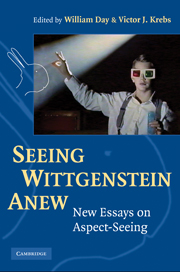Book contents
- Frontmatter
- Contents
- List of Contributors
- Acknowledgments
- Abbreviations of Wittgenstein's Works
- Seeing Wittgenstein Anew
- Introduction: Seeing Aspects in Wittgenstein
- I ASPECTS OF “SEEING-AS”
- II ASPECTS AND THE SELF
- III ASPECTS AND LANGUAGE
- 9 The Philosophical Significance of Meaning-Blindness
- 10 Wanting to Say Something
- IV ASPECTS AND METHOD
- Appendix: A Page Concordance for Unnumbered Remarks in Philosophical Investigations
- List of Works Cited
- Index
9 - The Philosophical Significance of Meaning-Blindness
Published online by Cambridge University Press: 05 June 2012
- Frontmatter
- Contents
- List of Contributors
- Acknowledgments
- Abbreviations of Wittgenstein's Works
- Seeing Wittgenstein Anew
- Introduction: Seeing Aspects in Wittgenstein
- I ASPECTS OF “SEEING-AS”
- II ASPECTS AND THE SELF
- III ASPECTS AND LANGUAGE
- 9 The Philosophical Significance of Meaning-Blindness
- 10 Wanting to Say Something
- IV ASPECTS AND METHOD
- Appendix: A Page Concordance for Unnumbered Remarks in Philosophical Investigations
- List of Works Cited
- Index
Summary
PLACING PHILOSOPHICAL INVESTIGATIONS PART II, SECTION 11 IN CONTEXT
We need to realize that what presents itself to us as the first expression of a difficulty, or of its solution, may as yet not be correctly expressed at all. Just as one who has a just censure of a picture to make will often at first offer the censure where it does not belong, and an investigation is needed in order to find the right point of attack for the critic.
(OC §37)Wittgenstein's philosophical criticism, he suggests here, calls out a sensitivity to language comparable to the aesthetic sensibilities of the art critic. “It is so difficult to find the beginning” (OC §471). The sources of this difficulty, Wittgenstein holds, lie in philosophical blindness to the very sensitivity that his way of philosophizing elicits. Directing us in how to follow the path of his writing, he advises that “we do not command a clear view of the use of our words”; to do so, we need a “perspicuous representation” which “produces just that understanding which consists in ‘seeing connections’.” “The concept of a perspicuous representation,” he adds, indicates “the way we look at things” (PI §122). In beginning at the beginning, we must be prepared to acknowledge that the words with which we are inclined to enter philosophy may obscure the nature of our “real need” (PI §108), and to alter our ways of thinking about and of expressing our philosophical confusions.
Keywords
- Type
- Chapter
- Information
- Seeing Wittgenstein Anew , pp. 183 - 203Publisher: Cambridge University PressPrint publication year: 2010
- 4
- Cited by

